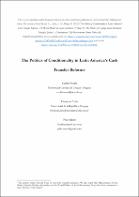JavaScript is disabled for your browser. Some features of this site may not work without it.
Mostrar el registro sencillo del ítem
The politics of conditionality in Latin America's cash transfer reforms [preprint]
| dc.rights.license | Licencia Creative Commons Atribución – No Comercial – Sin Derivadas (CC BY-NC-ND 4.0) | es |
| dc.contributor.author | Rossel, Cecilia | |
| dc.contributor.author | Antía, Florencia | |
| dc.contributor.author | Manzi, Pilar | |
| dc.date.accessioned | 2023-06-30T19:37:30Z | |
| dc.date.available | 2023-06-30T19:37:30Z | |
| dc.date.issued | 2022 | |
| dc.identifier.uri | https://hdl.handle.net/10895/1826 | |
| dc.description.abstract | The extent to which Conditional Cash Transfers (CCTs) are aligned with the social investment paradigm is still a contested issue. In this chapter, we offer new evidence to understand the conditions under which CCTs should be considered social investment reforms. To do so, we analyze the heterogeneity of 24 CCTs in 12 Latin American countries. We find that not all CCTs are created equal, but instead vary in the design and stringency of their conditionalities. We then turn to understanding this variation, arguing that the type of conditionality is driven by the political dynamics of reform. By analyzing the trajectory of four cases, we argue that ideological preferences are important to shape governments’ choices regarding conditionalities. When strong preferences are not present, though, there is room for conditionalities’ designs to be used by governments in an effort of coalition-building or to gain support from the opposition or specific constituencies. | es |
| dc.description.sponsorship | Agencia Nacional de Investigación e Innovación | es |
| dc.format.extent | 30 p. | es |
| dc.format.mimetype | application/pdf | |
| dc.language.iso | en | es |
| dc.publisher | Universidad Católica del Uruguay | es |
| dc.subject | Políticas sociales | es |
| dc.subject | América Latina | es |
| dc.subject | Subsidios familiares | es |
| dc.title | The politics of conditionality in Latin America's cash transfer reforms [preprint] | es |
| dc.type | Artículo | es |
Ficheros en el ítem
Este ítem aparece en la(s) siguiente(s) colección(ones)
-
Capítulos de libros [11]


